
News
Matcha Latte
Erfahren Sie mehr über den Antioxidantiengehalt, die energiespendende und stressreduzierende Wirkung von Matcha Latte. Vergleichen Sie ihn mit Kaffee und finden Sie Antworten auf häufige Fragen zu Sicherheit und Mäßigung.
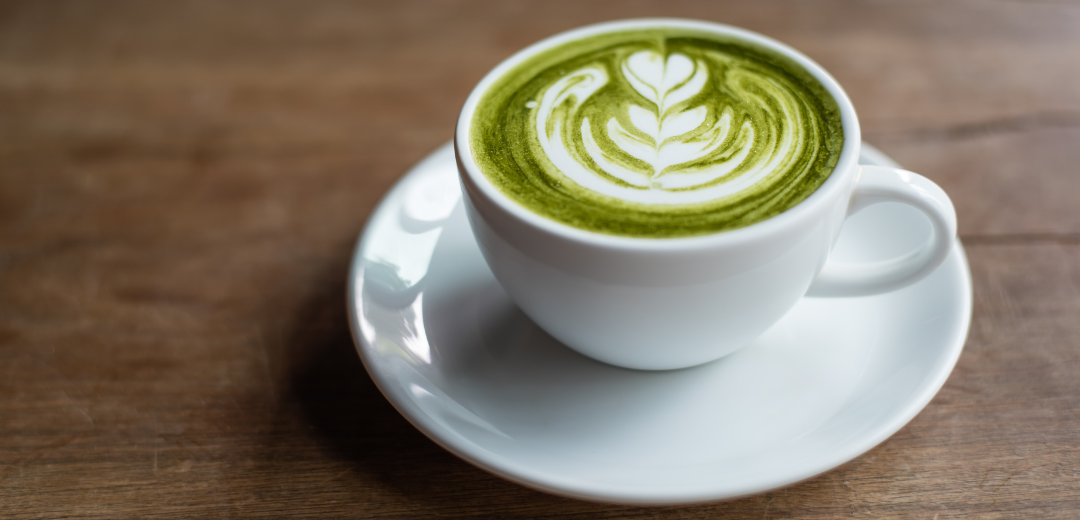
Was ist ein Matcha Latte?
Ein traditioneller Matcha-Tee-Latte ist ein warmes Getränk, das den intensiven Grünteegeschmack von Matcha-Pulver mit cremiger, aufgeschäumter Milch kombiniert. Das Ergebnis ist ein sanftes, wohltuendes Getränk, das sowohl belebend als auch köstlich ist.
Er wird oft als Muntermacher am Morgen oder als entspannende Leckerei am Nachmittag genossen. Matcha Lattes erfreuen sich aufgrund der gesundheitlichen Vorteile von Matcha und des wachsenden Trends zu Kaffeespezialitäten zunehmender Beliebtheit.

Sind Matcha Lattes gesund?
Matcha-Grüntee-Lattes gelten als eine gesündere Alternative zu anderen koffeinhaltigen Getränken wie Kaffee oder Softdrinks (Limonade). Matcha-Pulver wird aus beschatteten und gemahlenen Grünteeblättern hergestellt und ist daher eine hochkonzentrierte Quelle von Antioxidantien, Ballaststoffen und anderen nützlichen Inhaltsstoffen. Diese Inhaltsstoffe können helfen, steigern Sie Ihr Energieniveau , verbessern Sie Ihre geistige Wachheit und kognitive Funktion und vor oxidativem Stress schützen und Schäden.
Es ist jedoch wichtig zu bedenken, dass ein typischer Starbucks Matcha Latte Zucker und aufgeschäumte Milch enthält, was zusätzliche Kalorien liefern und den gesundheitlichen Nutzen mindern kann. Wählen Sie am besten ungesüßtes Bio-Matcha-Pulver und verwenden Sie fettarme oder pflanzliche Milch für ein gesünderes Getränk. Auch bei allen Speisen und Getränken ist Mäßigung wichtig. Übertreiben Sie es daher nicht und genießen Sie Ihren Matcha Latte als Teil einer ausgewogenen Ernährung.
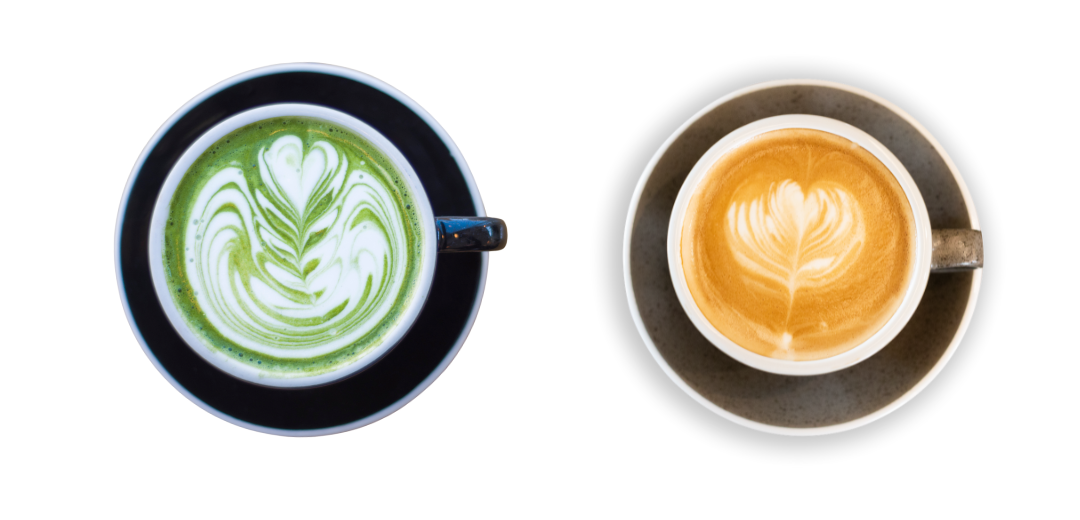
Ist Matcha Latte gesünder als Kaffee?
Matcha-Grüntee-Latte und Kaffee haben jeweils ihre eigenen Vor- und Nachteile. Ob ein Matcha-Latte gesünder als ein Kaffee ist, lässt sich nur schwer eindeutig sagen, da dies von verschiedenen Faktoren wie der Zubereitungsmethode, den verwendeten Zutaten und persönlichen Gesundheitszielen abhängen kann.
Matcha ist eine Art pulverisierter Grüntee, der aus im Schatten gewachsenen Teeblättern hergestellt und zu feinem Pulver gemahlen wird. Matcha ist reich an Antioxidantien, Polyphenolen und Aminosäuren und wird mit einer Reihe von gesundheitlichen Vorteilen in Verbindung gebracht, darunter eine verbesserte Herzgesundheit, mehr Energie und Konzentration sowie reduziertes Stressniveau .
Kaffee hingegen ist reich an Koffein, das für einen schnellen Energieschub und eine verbesserte Konzentration sorgen kann. Kaffee enthält außerdem Antioxidantien, die das Risiko bestimmter Krankheiten senken können.
Es ist wichtig zu bedenken, dass sowohl Matcha Latte als auch Kaffee zwar im Rahmen einer ausgewogenen Ernährung genossen werden können, übermäßiger Konsum beider Getränke jedoch negative Auswirkungen auf die Gesundheit haben kann. So kann beispielsweise übermäßiger Koffeinkonsum zu Angstzuständen und Schlafstörungen führen. Darüber hinaus kann zu viel Zucker oder fettreiche Milchprodukte in Ihrem Matcha Latte oder Kaffee den Kalorien- und Fettgehalt des Getränks erhöhen, was offensichtlich nicht gut für die Gesundheit ist.
Letztendlich hängt die beste Wahl für Sie von Ihren persönlichen Gesundheitszielen sowie Ihren Geschmacksvorlieben ab. Ich persönlich liebe Kaffee und Matcha und genieße beides täglich in Maßen.
Abonnieren Sie den RSS-Feed dieses Blogs unter http://premium-health-japan.myshopify.com/blogs/news.atom
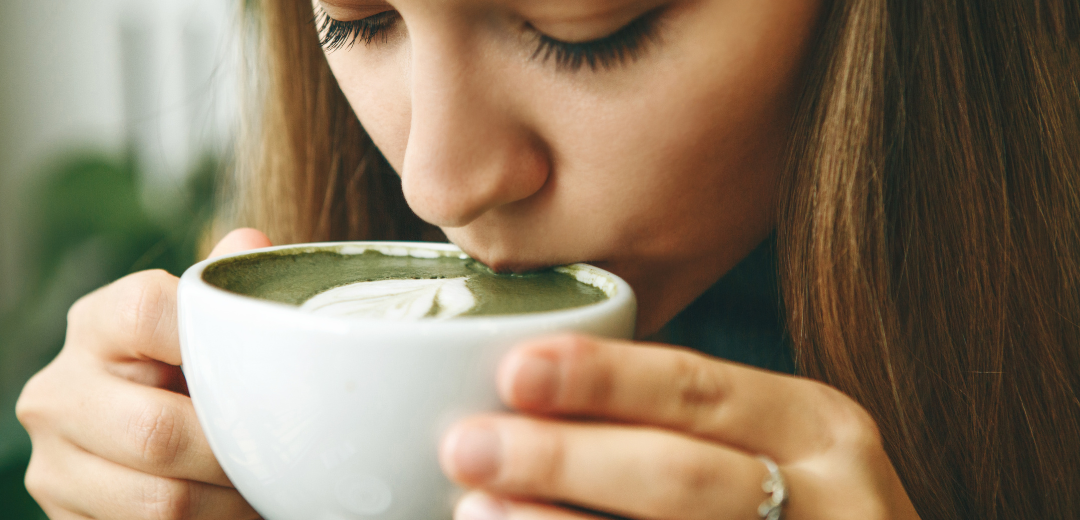
Ist es in Ordnung, jeden Tag Matcha Latte zu trinken?
Es gilt allgemein als unbedenklich, täglich einen Matcha-Grüntee-Latte zu trinken. Matcha ist reich an Antioxidantien und Nährstoffe die verschiedene gesundheitliche Vorteile haben, wie z. B. die Stärkung des Immunsystems, die Verbesserung der geistigen Klarheit und die Förderung der Herzgesundheit.
Es ist jedoch wichtig zu bedenken, dass Matcha-Tee-Lattes oft zugesetzten Zucker oder Sirup enthalten, die bei übermäßigem Konsum zu Gewichtszunahme, Karies und anderen gesundheitlichen Problemen führen können. Darüber hinaus enthält Matcha Koffein, das bei übermäßigem Konsum Schlaflosigkeit und andere Nebenwirkungen verursachen kann.
Es empfiehlt sich daher, Matcha-Grüntee-Latte in Maßen zu trinken und möglichst eine zuckerarme oder zuckerfreie Variante zu wählen. Es ist außerdem wichtig, einen Arzt zu konsultieren, bevor Sie Matcha-Latte regelmäßig zu sich nehmen, insbesondere wenn Sie unter Vorerkrankungen leiden oder Medikamente einnehmen.
Während das tägliche Trinken von Matcha Latte in Maßen eine köstliche und gesunde Angewohnheit sein kann, ist es wichtig, auf den Zucker- und Koffeingehalt zu achten und gegebenenfalls einen Arzt zu konsultieren.
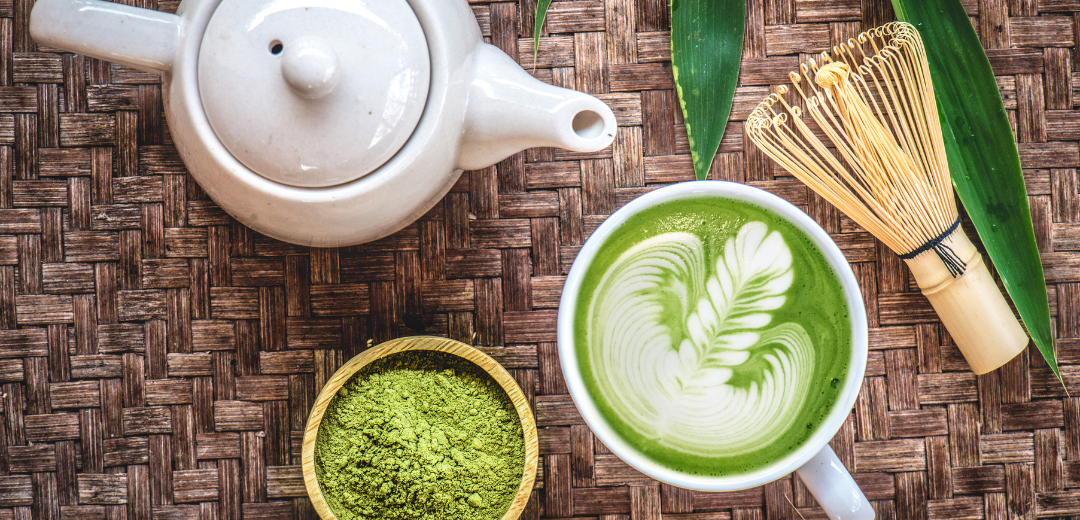
Welche Vorteile bietet das Trinken von Matcha Latte?
Das Trinken von Matcha Latte kann eine Reihe potenzieller gesundheitlicher Vorteile bieten, darunter:
-
Reich an Antioxidantien: Matcha wird aus im Schatten gewachsenen Teeblättern hergestellt, die reich an Antioxidantien sind, die dazu beitragen können, Ihre Zellen vor Schäden durch freie Radikale zu schützen.
-
Erhöhte Energie und Konzentration: Matcha enthält Koffein und die Aminosäure L-Theanin, die einen natürlichen Energieschub liefern kann und verbessern Sie Ihre geistige Konzentration .
-
Reduziertes Stressniveau: L-Theanin in Matcha hilft nachweislich Stress abbauen und Entspannung fördern .
-
Verbesserte Herzgesundheit: Die Antioxidantien und Polyphenole in Matcha werden mit einer verbesserten Herzgesundheit in Verbindung gebracht, indem sie den Blutdruck senken und den Cholesterinspiegel verbessern.
-
Angekurbelter Stoffwechsel: Einige Studien deuten darauf hin, dass die Catechine in Matcha den Stoffwechsel ankurbeln und die Fettoxidation steigern können, was bei der Gewichtsabnahme hilfreich sein kann.
-
Bessere Hautgesundheit: Die Antioxidantien in Matcha können auch dazu beitragen, Ihre Haut vor Schäden durch freie Radikale zu schützen, was zu einem jugendlicheren, strahlenderen Teint führen kann.
Es ist wichtig zu beachten, dass Matcha Latte zwar diese potenziellen gesundheitlichen Vorteile bieten kann, jedoch nur in Maßen als Teil einer ausgewogenen Ernährung genossen werden sollte und ein übermäßiger Konsum von Matcha oder anderen Lebensmitteln oder Getränken negative Auswirkungen auf Ihre Gesundheit haben kann.
Darüber hinaus empfiehlt es sich, natürliche Süßstoffe wie Ahornsirup, Honig, Agavendicksaft und Kokosblütenzucker zu verwenden. Pflanzliche Milchsorten wie Kokosmilch, Hafermilch, ungesüßte Mandelmilch sowie hochwertiges Matcha-Pulver ergeben ein sehr gutes Rezept und ein köstliches Getränk!
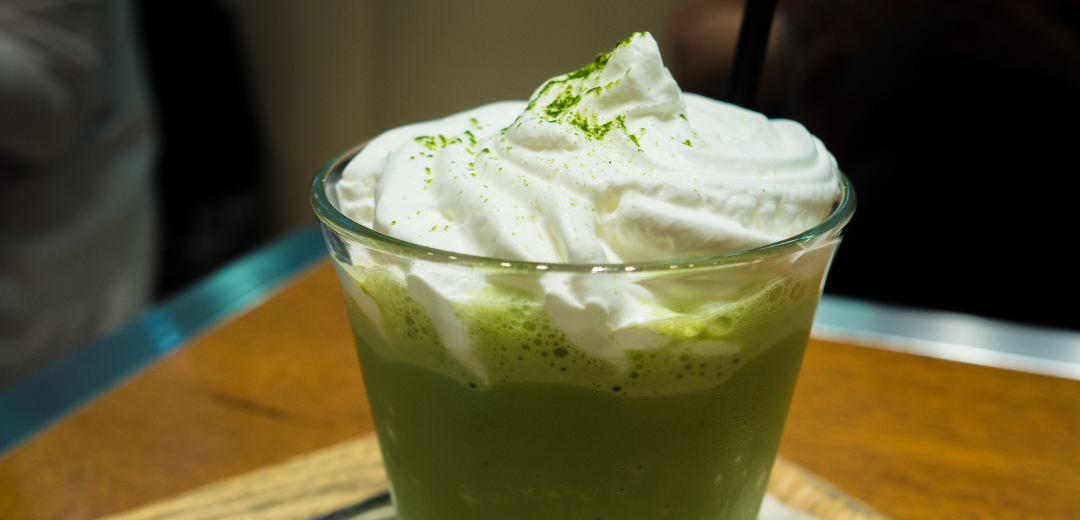
Machen Sie zu Hause einen Matcha Latte
Einen Matcha Latte zu Hause zuzubereiten ist ganz einfach. Hier ist ein Grundrezept:
Zutaten:
-
1 TL Matcha-Grünteepulver
-
2 Unzen heißes Wasser
-
250 ml Milch
-
1-2 TL Honig oder Süßstoff Ihrer Wahl (optional)
-
Schlagsahne (optional)
Anweisungen:
-
In einer kleinen Schüssel das Matcha-Grünteepulver und heißes Wasser glatt und schaumig rühren.
-
In einem Topf die Milch erhitzen, bis sie zu dampfen beginnt. Nicht kochen lassen.
-
Gießen Sie die aufgeschäumte Milch in eine große Tasse.
-
Geben Sie die Matcha-Mischung in die Tasse und rühren Sie, bis alles gut vermischt ist.
-
Falls gewünscht, Honig oder Süßstoff hinzufügen und umrühren, bis er sich aufgelöst hat.
-
Nach Belieben mit einem Klecks Schlagsahne garnieren.
-
Sofort servieren und Ihren köstlichen hausgemachten Matcha-Grüntee-Latte genießen!
Hinweis: Wenn Ihre Kaffeemaschine keine Dampfdüse hat, können Sie die Milch auch mit einem Milchaufschäumer oder Schneebesen aufschäumen. Sie können auch mit verschiedenen Milchsorten experimentieren, um die passende zu finden. Mandel-, Hafer- und leichte Kokosmilch sind beliebte Optionen.
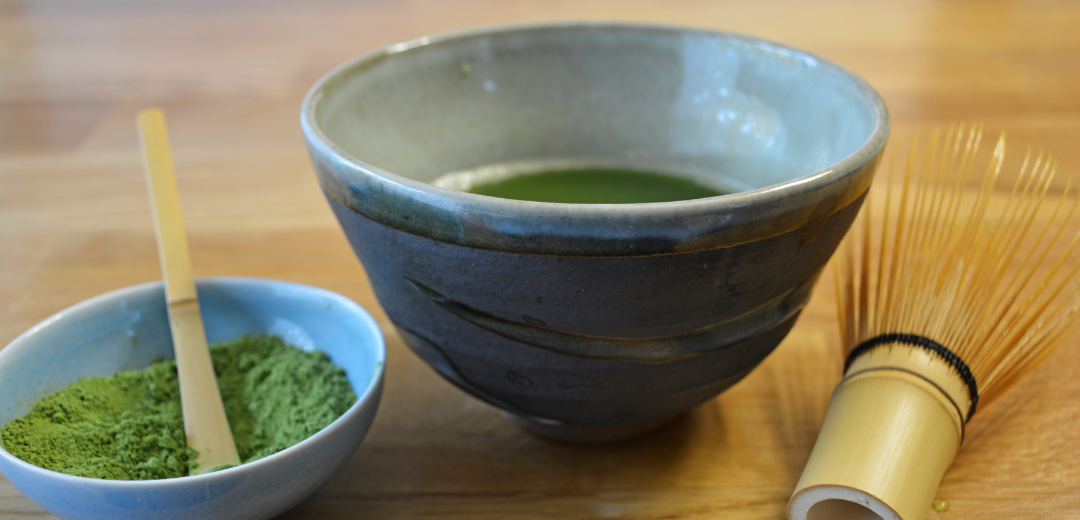
Welche Ausrüstung benötige ich?
Um einen Matcha Latte zu Hause zuzubereiten, benötigen Sie folgende Ausrüstung:
-
Hochwertiges Matcha-Pulver
-
Kleine Schüssel
-
Schneebesen oder Löffel
-
Topf
-
Milchaufschäumer (optional)
-
Großer Becher oder Tasse
-
Löffel zum Umrühren
Wenn du die Milch für deinen Latte aufschäumen möchtest, benötigst du zusätzlich eine Kaffeemaschine mit Dampfdüse oder einen separaten Milchaufschäumer. Du kannst die Milch aber auch auf dem Herd erhitzen und sie dann mit einem Schneebesen oder einem Milchaufschäumer manuell aufschäumen.
Eine Küchenwaage kann auch beim Abmessen des Matcha-Pulvers und anderer Zutaten hilfreich sein. So wird sichergestellt, dass Ihr Latte die perfekte Geschmacksbalance aufweist.

Welches Matcha-Pulver soll ich verwenden?
Für einen köstlichen Matcha Latte ist die Qualität des Matcha entscheidend. Der richtige Matcha kann den Geschmack und die Konsistenz Ihres Latte entscheidend beeinflussen.
Wenn Sie nach dem besten Matcha-Pulver für Ihren Latte suchen, sollten Sie unsere erste Bio-Sorte zur Frühjahrsernte. Matcha aus der ersten Frühlingsernte in Uji gilt als der feinste und hochwertigste Matcha. Unser Bio-Matcha wird nur einmal im Jahr geerntet, was ihn zu einer seltenen und besonderen Zutat macht.
Bio-Matcha-Pulver ist auch eine gute Option für alle, die eine gesündere Alternative suchen. Bio-Matcha ist frei von Pestiziden und Chemikalien, sodass Sie ein reines und natürliches Produkt konsumieren können.
Mit dem feinsten und hochwertigsten Matcha-Pulver aus der ersten Frühlingsernte können Sie einen köstlichen und authentischen Matcha Latte kreieren, der sich wirklich hervorhebt. Ob Sie ein Kaffeekenner sind oder einfach nur nach einer neuen und interessanten Art suchen, Matcha zu genießen – hochwertiges Matcha-Pulver ist der perfekte Ausgangspunkt.

Wie man Matcha ohne Bambusbesen zubereitet
Ein Bambusbesen wird traditionell für die Zubereitung von Matcha-Tee verwendet, ist aber nicht unbedingt erforderlich. Wenn Sie keinen Bambus-Matcha-Besen haben, können Sie mit anderen Werkzeugen trotzdem einen köstlichen Matcha Latte zubereiten.
So bereiten Sie Matcha ohne Bambus-Matcha-Besen zu:
-
Sieben Sie das Matcha-Pulver in einer kleinen Schüssel, um alle Klumpen zu entfernen.
-
Geben Sie 60 ml heißes Wasser in die Schüssel und rühren Sie den Matcha mit einem Löffel um, bis er vollständig aufgelöst und schaumig ist.
-
Nach Belieben 1–2 Teelöffel Honig oder Süßstoff hinzufügen und umrühren, bis sich dieser aufgelöst hat.
-
Erhitzen Sie die Milch in einem Topf, bis sie zu dampfen beginnt. Achten Sie darauf, dass sie nicht kocht.
-
Wenn Sie die Milch aufschäumen möchten, verwenden Sie einen Milchaufschäumer oder einen Schneebesen, um eine cremige und schaumige Konsistenz zu erzeugen.
-
Gießen Sie die aufgeschäumte Milch in eine große Tasse.
-
Geben Sie die Matcha-Mischung in die Tasse und rühren Sie, bis alles gut vermischt ist.
-
Nach Belieben mit einem Klecks Schlagsahne garnieren.
-
Sofort servieren und Ihren köstlichen Matcha Latte ohne Bambusbesen genießen!
Hinweis: Wenn Sie keinen Milchaufschäumer haben, können Sie die Milch auch mit einem Mixer oder einem Handaufschäumer aufschäumen. Sie können auch mit verschiedenen Milchsorten experimentieren, um die für Sie passende zu finden. Ungesüßte Mandelmilch und Hafermilch sind beliebte Optionen.
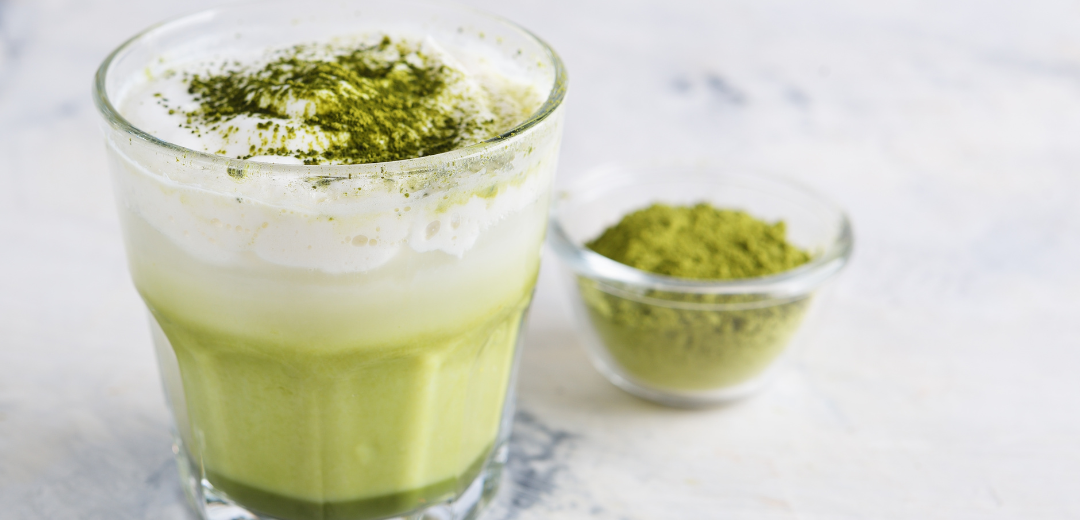
Unsere beliebten Matcha-Rezepte, die Ihnen schmecken werden
Hier sind einige beliebte Matcha-Rezepte, die Sie lieben werden:
-
Klassischer Matcha Latte: Dies ist ein traditionelles und einfaches Rezept für einen köstlichen Matcha Latte zu Hause. Mischen Sie einfach Matcha-Pulver, heißes Wasser und geschäumte Milch, um ein cremiges und schaumiges Getränk zu erhalten.
-
Matcha-Smoothie: Für ein erfrischendes und nahrhaftes Getränk probieren Sie doch mal einen Matcha-Smoothie. Mischen Sie einfach hochwertiges Matcha-Pulver, Mandelmilch, gefrorene Bananen und Ihre Lieblingsfrüchte zu einem köstlichen und gesunden Getränk.
-
Matcha Iced Latte: Wenn Sie Ihre Matcha-Getränke lieber kalt mögen, versuchen Sie es mit einem Matcha Iced Latte. Mischen Sie einfach Matcha-Pulver, kaltes Wasser und Ihre Lieblingsmilch auf Eis zu einem erfrischenden und belebenden Getränk.
-
Matcha Latte mit Mandelmilch: Für eine nussige Variante des klassischen Matcha Latte probieren Sie einen Matcha Latte mit Mandelmilch. Die Mandelmilch verleiht dem Latte einen cremigen und nussigen Geschmack, der den erdigen Geschmack des Matcha perfekt ergänzt.
-
Matcha-Grüntee-Frappuccino: Wenn Sie Lust auf ein süßes und cremiges Matcha-Getränk haben, versuchen Sie es mit einem Matcha-Grüntee-Frappuccino. Mischen Sie einfach Matcha-Pulver, kaltes Wasser, Ahornsirup und Kokosmilch zu einem köstlichen, cremigen Eisgenuss.
Dies sind nur einige der vielen Matcha-Rezepte, die Sie zu Hause ausprobieren können. Egal, ob Sie Ihren Matcha warm oder kalt, süß oder herzhaft mögen – es gibt das passende Matcha-Rezept für Sie!
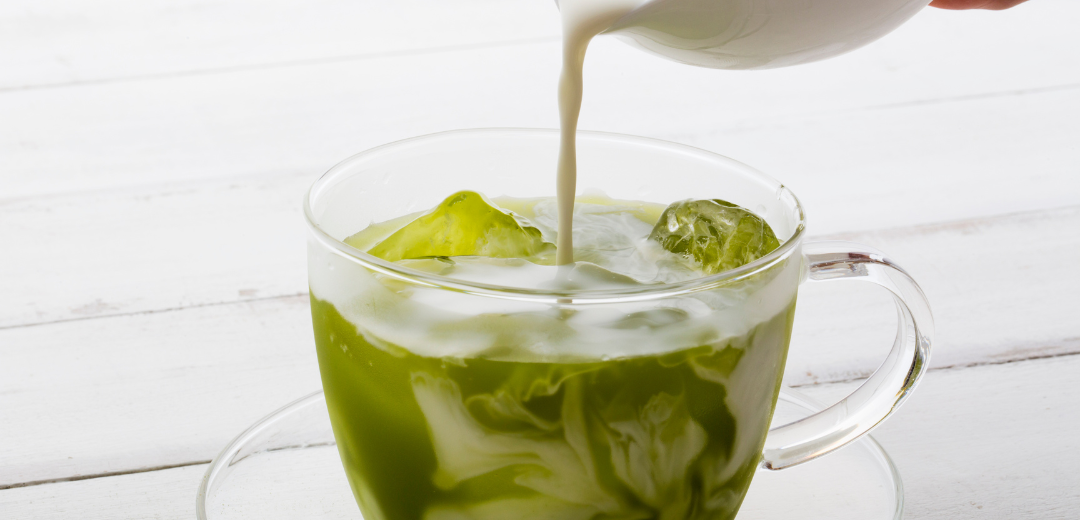
Welche Milch passt am besten zu Matcha?
Welche Milch sich am besten für einen Matcha Latte eignet, hängt von persönlichen Vorlieben und Ernährungseinschränkungen ab. Hier sind einige der beliebtesten Optionen:
-
Kuhmilch ist die traditionelle Wahl für Matcha Lattes, da sie einen cremigen, reichhaltigen Geschmack bietet, der den erdigen Geschmack von Matcha perfekt ergänzt. Am häufigsten wird Vollmilch verwendet, für eine leichtere Variante kann aber auch Magermilch oder fettarme Milch verwendet werden.
-
Sojamilch ist eine beliebte Alternative zu Kuhmilch und eignet sich besonders für Menschen mit Laktoseintoleranz und Veganer. Sojamilch verleiht einen leicht nussigen Geschmack, der gut zu Matcha passt.
-
Mandelmilch ist eine weitere beliebte Wahl für Menschen mit Laktoseintoleranz oder Veganer und sorgt außerdem für den leicht süßen, nussigen Geschmack, der Matcha ergänzt.
-
Hafermilch ist eine beliebte Alternative zu Kuhmilch. Ihr cremiger, leicht süßer Geschmack ergänzt den erdigen Geschmack von Matcha-Pulver perfekt. Sie ist auch eine gute Wahl für Menschen mit Laktoseintoleranz oder pflanzlicher Ernährung, da sie milchfrei und vegan ist.
-
Kokosmilch ist eine weitere Alternative zu Kuhmilch und eignet sich besonders für alle, die einen süßeren, cremigeren Geschmack bevorzugen. Sie enthält jedoch mehr gesättigte Fettsäuren als andere Milchsorten und ist daher möglicherweise nicht für Personen geeignet, die sich fettarm ernähren.
Letztendlich ist die beste Milch für einen Matcha Latte diejenige, die den Geschmack von Matcha ergänzt und Ihren persönlichen Geschmacksvorlieben und Ernährungseinschränkungen entspricht. Möglicherweise müssen Sie experimentieren, um die perfekte Milch für Sie zu finden.
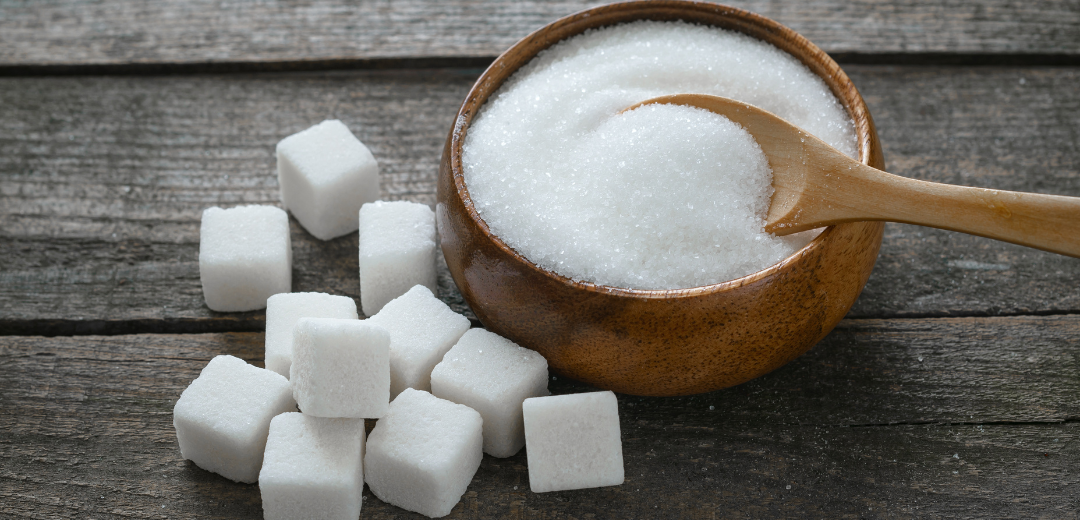
Gibt man Milch und Zucker in Matcha?
Ob Matcha mit Milch und Zucker zubereitet wird, ist Geschmackssache. Manche genießen Matcha lieber pur, nur mit Wasser, um den natürlichen Geschmack und die Nährstoffe des Tees voll auszukosten.
Andere bevorzugen es, ihrem Matcha Milch und/oder Zucker hinzuzufügen, um ein süßeres, cremigeres Getränk zu erhalten. Milch kann helfen, die natürliche Bitterkeit von Latte Matcha auszugleichen und ihn für Neueinsteiger zugänglicher zu machen. Die Zugabe von Zucker kann die Süße des Getränks noch verstärken.
Wichtig zu beachten: Milch und Zucker können die gesundheitlichen Vorteile von Matcha mindern und den Kaloriengehalt erhöhen. Für einen gesunden Lebensstil empfiehlt es sich, Matcha nur mit Wasser oder pflanzlicher Milch zu genießen und die Zuckermenge zu begrenzen (Ahornsirup, Agavendicksaft oder Honig als Alternative). Matcha in Zeremonienqualität ist die beste Wahl, da er nicht bitter schmeckt und man weniger Zucker oder Süßstoffe hinzufügen möchte.
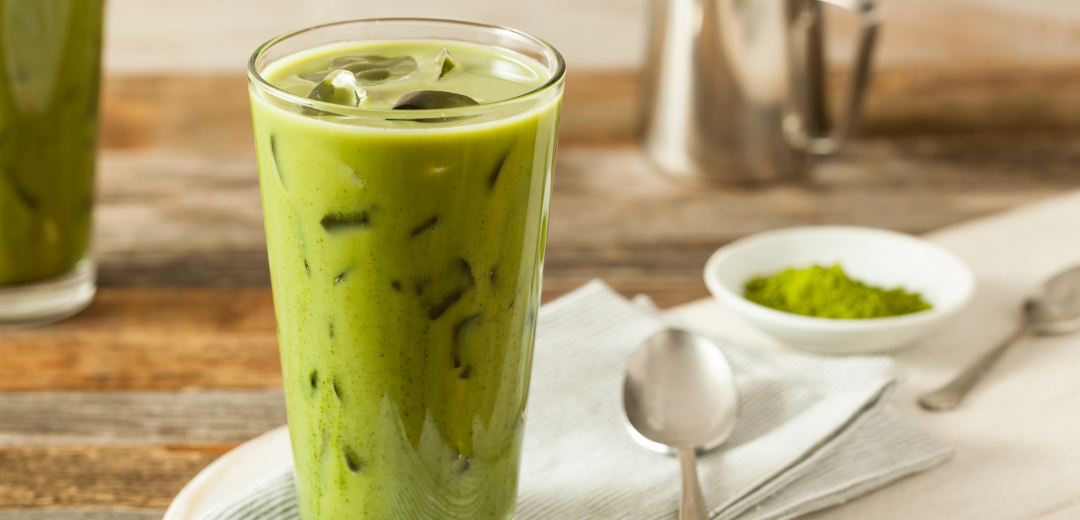
Kann man Matcha einfach in Milch geben?
Ja, Sie können Matcha mit Milch vermischen, um ein einfaches und köstliches Getränk zuzubereiten. Mischen Sie dazu einfach die gewünschte Menge Matcha-Grünteepulver mit etwas warmer Milch zu einer Paste, geben Sie dann die restliche Milch hinzu und erhitzen Sie alles auf die gewünschte Temperatur. Sie können die Milch auch aufschäumen, um ein cremiges Getränk im Latte-Stil zuzubereiten.
Wichtig: Wenn Sie Matcha in Milch geben, verwenden Sie am besten hochwertiges Matcha-Pulver, um den Geschmack und die vielfältigen Vorteile des Tees voll auszukosten. Die Verwendung von minderwertigem oder abgelaufenem Matcha kann zu einem bitteren oder unangenehm schmeckenden Getränk führen.
Matcha mit Milch zu verfeinern ist eine tolle Möglichkeit, den Tee einfach und wohltuend zu genießen. Experimentieren Sie mit verschiedenen Matcha-Milch-Verhältnissen, um Ihr persönliches Geschmackserlebnis zu finden.

